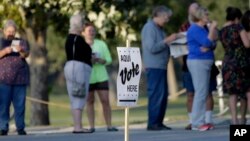On the eve of Thursday's 50th anniversary of the passage of the landmark Voting Rights Act, a U.S. appeals court struck down a Texas law requiring voters to show authorized identification before casting ballots, declaring it has a “discriminatory effect” on minorities.
The appeals panel sent the law back to the lower court to consider how to fix the discriminatory effects.
Democrats and minority rights groups saw Wednesday's court ruling as a victory, although not a sweeping one.
While the three-judge appeals panel said the Texas law violates the federal voting law, it disagreed with a Texas federal judge who last year called it the equivalent of an unconstitutional “poll tax.”
Free voting IDs are available from the state, but opponents said getting those cards still put underlying financial costs on voters, such as paying for birth certificate copies and travel.
"We believe in a secure ballot, but this law doesn't get us there. Now we have an opportunity to improve on the legislation and make sure the interests of the minority community are not ignored in this process," said Jose Garza, attorney for the Mexican American Legislative Caucus, one of the groups that sued over the voter ID law.
Texas Republican Gov. Greg Abbott called it "imperative" that Texas has a voter ID law, and said the state will continue fighting for the measure.
Seek protections
Black leaders attending the annual meeting of the Progressive National Baptist Convention in Dallas Wednesday said they were pleased by the 5th U.S. Circuit Court of Appeals' decision, the Dallas Morning News reported.
The attendees, including civil rights pioneer Andrew Young and Martin Luther King III, urged Congress to pass a Voting Rights Advancement Act to ensure federal protections on voter rights, according to the newspaper.
“Democracy is not working at its maximum level,” Charles Steele, president and CEO of the Southern Christian Leadership Conference, said during a panel discussion on the Voting Rights Act, the paper reported. “It works for some, but not for all.”
The last few years in America have been a “merciless, relentless assault on voting rights,” said the Rev. Raphael Warnock of Ebenezer Baptist Church in Atlanta, pointing to a 2013 Supreme Court ruling that struck down a provision of the Voting Rights Act that requires federal approval of state and local voting law changes.
A brief look at Wednesday's ruling, the law and where the case stands now:
What does the ruling mean?
The U.S. 5th Circuit Court in New Orleans found that Texas' law requiring residents to show state-approved IDs in order to cast ballots violated Section 2 of the Voting Rights Act, a 50-year old federal statute prohibiting discrimination against minorities.
Its ruling followed a decision last year by the lower, Corpus Christi-based U.S. District Court that likened the law to an unconstitutional “poll tax” that could require some poor Texans to pay to vote because of fees associated with obtaining necessary IDs.
The ruling Wednesday rejected the “poll tax” finding since Texas has taken steps to allow residents to receive IDs for free. But it upheld the lower court's assertion that the effect of the law was nonetheless discriminatory.
What happens next?
The case returns to the U.S. District Court, which will have to decide whether the Texas Legislature intended to discriminate against minority voters when it drafted and passed the law.
Among the questions:
What is the voter ID law?
Approved by the GOP-controlled Texas Legislature in 2011, the law requires voters to show one of seven approved forms of photo ID in order to vote, with or without a voter registration card. Permissible IDs include a Texas driver's license, U.S. passport, state-issued ID card, Texas concealed handgun license or a U.S. military ID.
Where does the law stand now?
The 2014 district court ruling struck down Texas' voter ID law, but it came just days before the November election. To avoid confusion, the U.S. Supreme Court declared that elections should go forward under the law, and it remains enforced today.
How did the court case against the law begin?
Advocates and legal experts sued in federal court, arguing that Texas was deliberately discriminating against poor, largely minority voters by placing an undue burden with the ID requirement.
The Obama administration subsequently joined the case, further arguing that the law was discriminatory.
It was initially blocked after a ruling that it could violate the Voting Rights Act. But Texas was allowed to implement the ID requirements after the U.S. Supreme Court in 2013 struck down Section 5 of the act, which had required nine mostly Southern states with a history of discrimination to seek approval before changing election laws.
Still, Wednesday's ruling found that, Section 5 aside, the law nonetheless met the higher legal threshold of violating the Voting Rights Act's Section 2, which requires proving that it discriminated against minority voters.
Some material for this report came from AP and Reuters.





